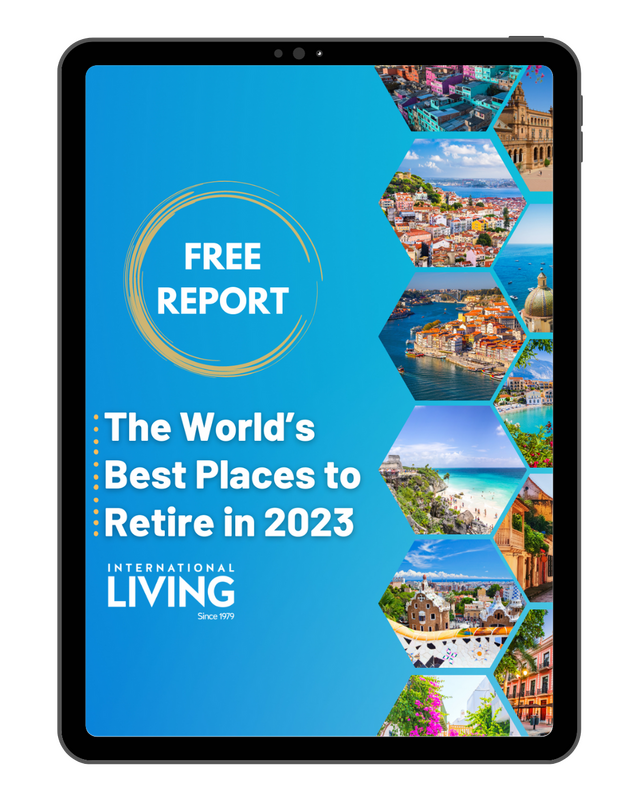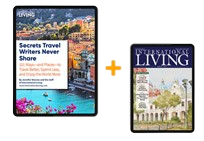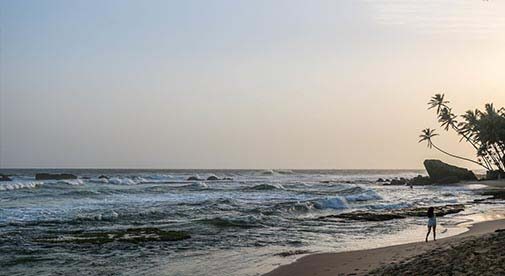Glenn and Fiona Howard had visited Sri Lanka many times on vacation, always enjoying its rich culture, friendly people, and beautiful climate, but they never thought on those vacations that one day they would call it home. They were just too busy to think long-term.
In fact, in the course of their working lives in the city of Melbourne, Australia, the couple didn’t even see much of each other. “We both worked in nursing,” says Glenn. “I was a theater nurse and worked days and evenings, and Fiona worked the night shift as the associate director of nursing. Most days we crossed paths or exchanged a few words. Our brief conversations always revolved around our young son, Yannick.” You can imagine the pressure.
Exhausted mentally and physically, both Glenn and Fiona had health issues that should not be experienced by people in their late 40s. The cold weather in Melbourne affected Fiona’s arthritis, and she was in pain all winter. They knew they needed a change. As if in answer to their prayers, Fiona discovered she was able to take paid long service leave for one year. This was the start of their journey. “Glenn and I decided to take this time away and give ourselves not just a much-needed break, but the opportunity to discover each other again, to travel, and heal.”
Sri Lanka was top of Glenn and Fiona’s list, given the happy memories they had of their vacations on the island. They found tenants for their family home, which would bring in some useful funds each month, packed their bags, and proceeded directly to Sri Lanka.
The initial plan was to live for one year, recharge their batteries, and come back to Melbourne refreshed. Neither of them had any intention to retire, and it definitely wasn’t their intention to live in Sri Lanka permanently. “Language barriers, adjusting to cultural norms, making friends; those were a few problems we needed to tackle. But our primary concern was Yannick,” says Fiona. Uprooting their nine-year-old son from the only life he knew and taking him far away from grandparents, friends, and other family seemed quite scary to both Glenn and Fiona.
They needn’t have worried. “Sri Lanka has an extensive expat community, most people speak English, and the international schooling system is second-to-none. We enrolled our son in the British School where a lot of the children of expat parents attend. Yannick quickly made friends with kids from all over the world and transitioned into his new life quite smoothly.”
After a surprisingly seamless transition, all three settled into their new surroundings in the main city of Colombo, in a quaint little home with a garden filled with trees, flowers, and birds. The luxurious life they found was nothing like how they had lived in Melbourne. More than anything, life on the island helped them discover the beauty of doing nothing much.
Tropical fruit each morning, prepared by our cook.
“Labor is quite cheap, and most people employ maids,” says Fiona. “It was wonderful to wake up every morning to sunshine and to the chirping of birds. A freshly brewed pot of Ceylon tea with an authentic Sri Lankan breakfast of fresh tropical fruit and creamed rice awaited us each morning, skillfully prepared by our cook. We were certainly getting used to being spoiled.”
The family found love, connection, and joy. “For the first time since getting married we were able to actually connect, spend time, and enjoy being with each other,” Glenn says. “We didn’t need to rush back to our jobs, and just the thought of it was so liberating. Sri Lanka, being centrally located, made it quite affordable to travel to countries such as India, Vietnam, Malaysia, Thailand, or even Europe.” Glenn and Fiona also discovered that they didn’t need to go so far for an adventure.
“Sri Lanka is such a hidden gem. The culture dates back over 2,500 years and discovering its ancient history through travel was marvelous. Every part of this little island varies from one place to another and every place is quite breathtaking,” says Fiona.
The island of Sri Lanka covers just 25,000 square miles, about the same as the state of Georgia. New highways make it easy to travel. “We visited national parks and drove in open safari jeeps to see elephants and leopards, climbed ancient mountains to see historic sites, visited temples and ruins, held protected baby turtles in the palm of our hands, drank delicious tea at the tea plantations, saw schools of dolphins, and magnificent blue whales. In the evenings of day trips, we lay on beautiful beaches to watch glorious sunsets,” Fiona recalls.
After nine months of living in Sri Lanka, Glenn, Fiona, and Yannick reevaluated their lives. They all loved their new home, but both Glenn and Fiona understood that living there permanently was different from living for one year. There was much to think about. They were both still quite young, and each wanted to do something with their lives that was meaningful to them personally. They needed to check on long-term visas, health insurance, available work, or the possibility of starting a business. Luckily, they had made solid connections with other expats and met with experienced local people who were able to direct them toward the best ways to make Sri Lanka their permanent home.
One thing that brought them comfort was that Yannick was extremely well settled in his school and loved every aspect of living in Sri Lanka. “Seeing him happy made our decision to live permanently in Sri Lanka so much easier,” says Glenn. “We handed in our resignations to jobs back in Australia that did not seem to fit our lifestyle any longer.”
With that decision made, it felt like a weight was lifted off their shoulders. Next came the decision on whether to stay settled in Colombo, or to branch off to the southern tip of Sri Lanka, famous for its surfing and blue water beaches. The decision was a challenge for the family, as each location had its own pluses and minuses. “Both Yannick and I are beach bums,” says Glenn. “We love walking barefoot in our shorts on the beach and swimming in the warm waters of the Indian Ocean.”
However, Fiona loved the city life. “As much as I like the beach, I love the luxuries of living in the city, with its shopping, amazing restaurants, and great nightlife. The international schools are also mostly located in the city, and we needed Yannick to attend a good school,” she says.

Colombo is extremely cosmopolitan. The shopping is varied, the food choices are vast, the arts and culture scene is inspiring. The nightlife includes jazz bars, live piano music, dance clubs, and one of Southeast Asia’s oldest orchestras. Everything is conveniently located, including the international schools. A huge community of expats in the city includes diplomats, those working in nonprofit organizations, and expats who have chosen to work remotely or retire in Sri Lanka. It’s an exciting mix. However, living in the city can get quite expensive. Monthly rent for a two-bedroom house or apartment can range from $600 to $3,000, depending on how close you are to the city center and what range of conveniences you are looking for.
A couple can live on less than $1,750 a month.
In the south, by contrast, life is more relaxed. You spend your days mainly on the beach or in the garden. You can wake up each morning, stroll down the beach, and find a great little place to have coffee and breakfast for less than $2. The expat community is mostly made up of retirees. The biggest advantage is that a couple can get a decent house, employ a maid, and live comfortably here for less than $1,750 a month.
“Our decision on where we should live was based on two things. Schooling for Yannick and the path that both Fiona and I wanted to take personally,” Glenn says. “It was my dream to operate an Airbnb and we decided to do this in Weligama, a tourist area on the beach in the southern part of Sri Lanka.”
Glenn and Fiona bought an old house and renovated it to become a modern-day bed and breakfast, whilst maintaining its antique charm. They added a pool and maids’ quarters to the property and hired local workers who would live in, take care of, and cook for their guests. The house also serves as the family’s weekend and vacation place and will eventually become their primary home once Yannick completes high school. It’s a one-hour drive from the city, so they can get there often.
During the week, the Howards enjoy living in the city, meeting up with friends, shopping, and being a part of the city’s vibrant culture. Fiona enjoys working part-time at a hospital and contributing her knowledge in nursing. They all enjoy driving to their home on the beach for relaxing weekends, and even though Glenn puts in a few hours each time to take care of the business administration, life at the beach house is a time for them all to unwind and enjoy the coastal environment and its abundant nature.
“Long walks on the beach, a swim each morning in the pool, watching the sunset while sipping cold beer, and eating fresh seafood is what life is all about for us,” says Glenn.
“We really have the best of both worlds,” Fiona admits. “City life and beach life, on an island rightfully called the Pearl of the Indian Ocean. Do we miss Australia? Not really. But we do miss our families sometimes.” But it’s not a lifetime of exile by any means. The whole family travels back to Australia at least once a year, stopping along the way to discover another destination on layovers. “We have a steady income from our bed and breakfast and our home rental in Australia,” says Fiona. “Looking back, our stressful life in Australia seems like a bad dream. Our only regret about changing our life is that we didn’t do it sooner.”

Get Your Free Report on the World’s Best Places to Retire:
Learn more about the best places in the world to retire in our daily postcard e-letter.
Simply enter your email address below to sign up for our free daily postcards and we’ll also send you a FREE report on The World’s Top 10 Retirement Havens, plus access to over 10 more free reports. Our gift to you, on our favorite destinations.
Related Articles
The World’s Best Places to Retire
Post-Pandemic Travel Hacks: 3 Money-Saving, Insider Tips
The Best Towns and Cities to Retire in Southeast Asia
Upcoming Conferences
The Only 2024 Fast Track Panama Conference
If your dream retirement involves stunning beaches… lush green mountains… a warm climate with no hurricanes… first-rate healthcare… incredible value for money (a couple can live well on $2,200 a month)… and the World’s #1 Retiree Discount Program…
Join our Panama experts and expats in February and discover why Panama could be your perfect paradise.



.png)